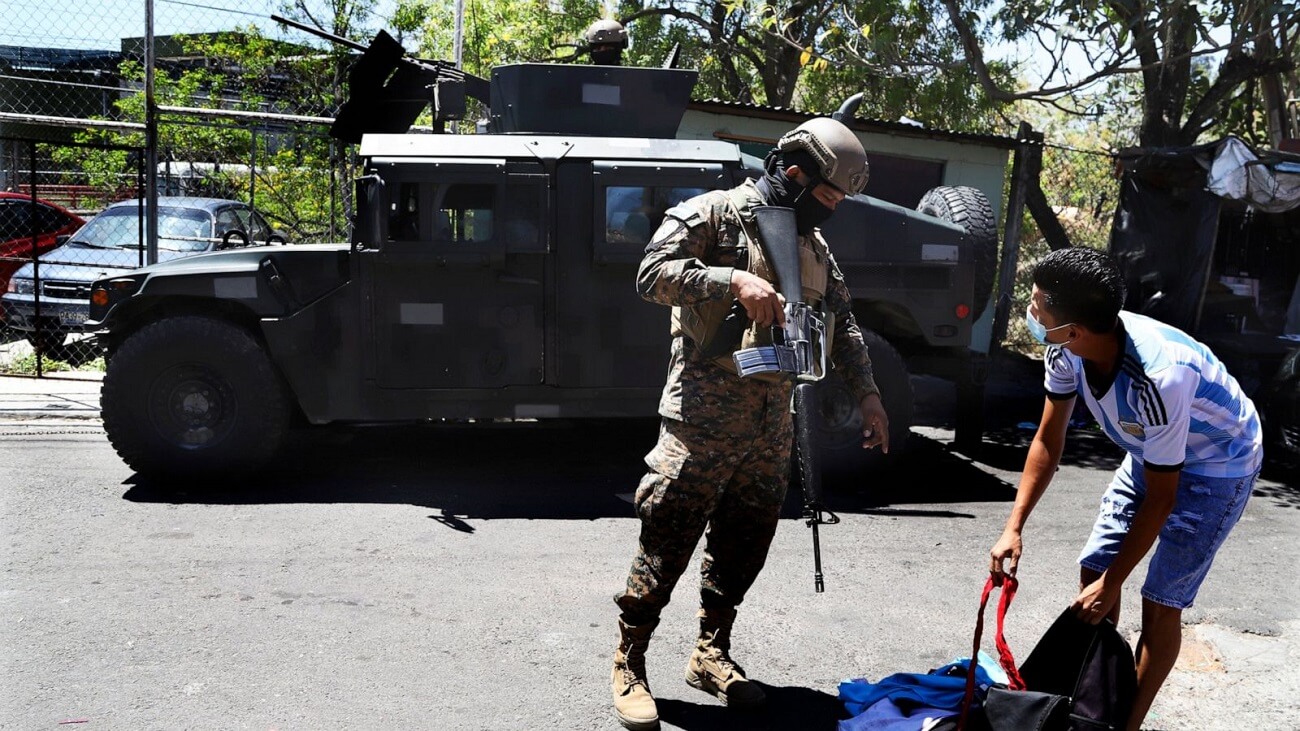On Wednesday, 67 out of 84 lawmakers in El Salvador’s parliament voted to extend President Nayib Bukele’s “state of exception,” which was first imposed on March 27 in order to crack down on gang violence. Since then, over 34,500 alleged gang members have been arrested, drawing huge scrutiny from rights groups about due process in the country.
Security Minister Gustavo Villatoro stood firmly behind the move, saying the emergency measure would continue to be extended “for as long as necessary and to the extent that the public continues to demand it.” He declared, “We are going to continue to confront this cancer, and we have said it before and we stand by it, this war will continue until the gangs are eradicated from the territory of El Salvador.”
He also pushed back against criticism of rights abuses, asserting that gangs cannot be “eradicated with chemotherapy.” He also essentially confirmed that the measure is likely to be extended once more, saying, “We need more time to continue eradicating this cancer from all of our country’s communities.”
Gracias a las herramientas constitucionales que brinda el Régimen de Excepción, estamos desarticulando las estructuras criminales que por décadas han mantenido en zozobra al país.
— Casa Presidencial 🇸🇻 (@PresidenciaSV) May 27, 2022
Estamos logrando que El Salvador sea el país seguro que todos soñamos. #GuerraContraPandillas. pic.twitter.com/aaIxD1lE1y
The decree allows authorities to arrest suspects without a warrant and restricts their right to legal counsel. The amended rules also extend prison terms for convicted ‘gang lords’ from 6-9 years to 40-45 years and for gang members to 20-30 years.
The ‘state of exception’ also restricts the right to free assembly, the right to be informed of why one is being arrested, and allows for detention for up to 15 days without a judicial hearing, as opposed to the constitutionally-required 72 hours.
Furthermore, since the measure was first put in place two months ago, the parliament has also passed laws that can sentence journalists who put out messages from gangs to between 10 and 15 years, which critics say undermines press freedoms and obstructs the work of gang tracking groups.
Lawmakers have also reduced the age of criminality to 12, wherein children between 12 and 16 years of age can now be handed sentences of up to 10 years, while minors above 16 can be imprisoned for 20 years.
These radical changes came after over 80 people were killed in a single weekend on March 26 and 27.
Rights groups have criticised these measures, with Tamara Broner, the acting Americas director at Human Rights Watch (HRW), lambasting security forces for “abusing the overly broad powers granted to them” under the state of exception.
Abuses by gangs and security forces continue to plague El Salvador. Girls and women accused of having abortions have been imprisoned for homicide while LGBT people face discrimination and police violence. #Rights2022 https://t.co/BYg1d3VX4D
— Human Rights Watch (@hrw) January 15, 2022
These have led to allegations of severe human rights violations by the government. Based on interviews with victims, relatives, lawyers, and activists, HRW highlighted that the country has witnessed dozens of arbitrary arrests, short-term enforced disappearances, and deaths of people in custody.
Police reportedly target low-income neighbourhoods, with arrests often based on a person’s appearance or where they live.
Marvin Reyes, general secretary for the Movement of Workers of the Salvadoran National Police, told Al Jazeera that the police have been instructed to fill “arrest quotas,” which reached as high as 1,000 per day in April.
A police spokesperson, however, had earlier denied the quota allegations in a statement to Reuters saying that such an order is considered to be a “serious offence.”
The military and the judiciary, too, have been pressured to implement the mass arrest and incarceration policy. Justice Antonio Durán lamented that the “Supreme Court has been co-opted completely” and only “does what the presidential house says.”
Reports of overcrowding in jails pushed the Legislature on April 19 to approve a law for creating new prisons, as inmates continue to be denied mattresses and survive on lower food rations.
De acuerdo a las casas encuestadoras internacionales, el apoyo está por encima del 90%, pero es interesante que una institución que ataca al Gobierno día y noche, acepte esto.
— Nayib Bukele (@nayibbukele) May 25, 2022
Seguimos…#GuerraContraPandillas https://t.co/cAl14qJjXa
Although homicide rates in the country have come down as a result of the measures, gangs maintain a stronghold specifically in poor neighbourhoods, where the state has long been absent, forcing thousands to emigrate to escape indiscriminate violence by security forces and forcible recruitment by criminal gangs.
Nevertheless, Bukele’s popularity appears relatively intact. An opinion poll by the Francisco Gavidia University's Center for Citizen Studies showed that 72% of Salvadorans supported a second term for the President, with citizens asserting that they are “tired of killings and extortion.”

